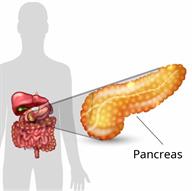ThisisPatientEngagementcontent
Exocrine Pancreatic Insufficiency
Learn more about our Patient Engagement products now! Turn your patients into active participants in their healthcare by giving them easy access to the same evidence-based information you trust – but delivered in an easy-to-understand format.

The pancreas is a gland in the abdomen between the stomach and the spine. The pancreas makes hormones and enzymes that help the body control blood sugar, digest food, and store energy from food.
Exocrine pancreatic insufficiency (EPI), is when the pancreas does not make enough proteins (enzymes) to digest food. If EPI is not treated, your body may not get enough nutrition or vitamins from the food you eat. EPI may lead to weak bones (low bone mass), a weak body defense system (immune system), and an increase in your risk of heart problems.
Eating and drinking
General instructions
This information is not intended to replace advice given to you by your health care provider. Make sure you discuss any questions you have with your health care provider.
Cookies are used by this site. To decline or learn more, visit our cookie notice.
Copyright © 2025 Elsevier, its licensors, and contributors. All rights are reserved, including those for text and data mining, AI training, and similar technologies.